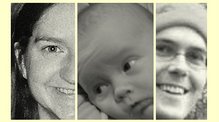i wonder, is it true ... was it true then ...
would i like it to be true ... ?
I accelerate on off-ramps. I have no trouble obeying the speed limit on the freeway, but somehow, after I pass that little green exit sign, I feel like I own those fifty yards. They are calling for a thrilling burst of speed followed by a punch on the breaks.
I live my life like I’m driving down a six-lane freeway, cruising in my own set of wheels and pumping music from the dashboard. Most of the time I’m collected, reasonable; I obey the law. I never need to hit the breaks when I see cop staking out the cars from the side of the road—I’m always going the speed limit, sometimes I’m going under it. But that’s all right with me.
When my father taught me how to drive he was relaxed and laughing in the passenger seat. He told me to pay no attention if people were tailgating me—I should drive comfortable. And if comfortable for me meant fifty-seven in a sixty-five, well, that was all right. I smiled when he told me that. And I’ve been driving comfortable ever since.
I don’t pay any attention when people want me to go along with the crowd; I just live comfortable. Happiness, I’ve found, comes from listening to myself. And somehow, I don’t have a problem with driving slower in a fast-paced world, or doing homework on a Friday night, or eating ice cream outside in the middle of a snowstorm.
But sometimes, life calls for a little craziness. So I push that accelerator all the way to the floor on those off-ramps. Those little detours in life that sometimes make or break us—that take our identity and stretch it out. I build up speed and excitement and passion until I’m certain that, at any moment, I will fly.
